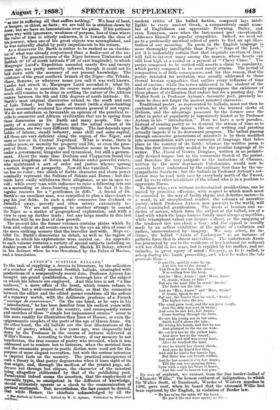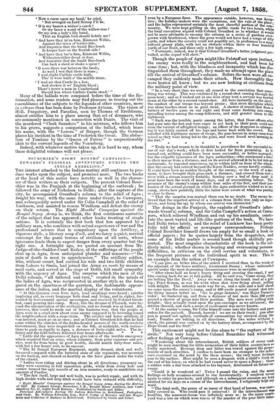ATTOLTN'S SCOTTISH BALLADS."
To the task of supplying a lacuna in literature by the collection of a number of really ancient Scottish ballads, unmingled with productions of a comparatively recent date, Professor Aytoun has brought one grand qualification a thorough love of the subject on which his labours are employed. And this love is not "a fine madness," a mere affair of the heart, which reason refuses to sanction, but a well-considered affection, so that the connexion between the editor and the edited poems combines all the ardour of a runaway match, with the deliberate prudence of a French "manage de convenance." On the one hand, as he says in his "introduction," he has been familiar from his earliest years with the traditionary poetry of his country, and consequently verses and snatches of those "simple but impassioned strains" occur to him more readily for illustration than lines of Horace, or even the epigrammatic couplets of the poets of the age of Queen Anne. On the other hand, the old ballads are the best illustrations of the theory of poetry, which, a few years ago, was eloquently laid down by the Professor in the course of lectures delivered at Willis's Rooms. According to that theory, if our memory be not treacherous, the true essence of poetry was revealed, when it was addressed not to readers but to listeners, when the metrical form and the ornaments proper to poetic diction were used not for the Purpose of mere elegant recreation, but with the serious intention to imprint facts on the memory. The practical consequence of such a theory is, that poetry degenerates when it loses sight of its first origin, and, through the medium of the printed. page ad- dresses not throngs but cliques, the character of the minstrel being altogether obliterated by that of the publishing poet. Paradoxical indeed seems the assertion, that the employment of raoveable types, so omnipotent in the diffusion of knowledge, should ultimately operate as a check to the communication of Poetical sentiment. But, nevertheless, the fact cannot be denied, that while Homer, the chieftain acknowledged by all the
nte Ballad; of Scoiland. Edited by W. E. Aytoun. Published by Blackwood Ind Sons.
modern critics of the ballad faction, composed lays intel- ligible to every ancient Greek, a comparatively small num-
ber of Englishmen can appreciate Browning, Bailey, and even Tennyson save when the last-named poet exceptionally addresses himself to popular sympathies. Indeed, we need not go to a professedly mystical school of poets to find an apt illus- tration of our meaning. No poem in the English language is more thoroughly intelligible than Pope's "Rape of the Lock," yet it is undeniably certain that that exquisite creation. of fancy will fail to interest many among the masses, whose hearts can still beat high at a recital or a perusal of "Chevy Chase." The poetry composed to be recited still asserts a claim to popularity, which poetry composed to be read rarely attains. The periodof
i composition s of little consequence, and 'for this reason, that the poetry intended for recitation was usually addressed to those eternal human sympathies that outlive every influence of time and of custom ; while the verses addressed to the student of the closet or the drawing-room generally presuppose the existence of those phases of civilization that endure but for a passing day. Sir Walter Scott is Professor Aytoun's favourite poet, precisely be- cause he does not forget the ancient minstrel character. Traditional poetry, as represented by ballads, must not then be confounded with old poetry written by the learned clerks of Helicon, and the advantage possessed by the former over the latter in point of popularity is ingeniously hinted at by Professor Aytoun in his "introduction." Here we have a new paradox. Instead of causing poetry so to descend the stream of time as to be diffused among the masses, the arts of writing and printing actually impede it in its downward progress. The ballad passing through successive generations of minstrels is by them modified into accommodation with every variation of language that takes place in the country of its birth ; whereas the written poem is from the first irrevocably wedded to the peculiar language of its writer. The Aneid of Gawin Douglass, written in no pedanti- cally devised tongue but in the vernacular Scotch of the period, and therefore the very antipode to the imitations of Chaucer, written by the more degenerate Caledonians, would now be scarcely better understood by the ordinary Scot than by the un- sympathetic Southern ; but the ballads in l'rofessor Aytoun's col- lection may be read with ease by everybody north of the Tweed, and by every other inhabitant of the island who is in a position to appreciate Burns. To those who, even without archeological predilections, can be
moved by primitive effusions, with respect to which much must be conceded in the way of faulty rhyme and defective metre—in a word, to all unsophistical readers, the volumes of narrative poetry, which Professor Aytoun now presents to the world, will afford unmingled gratification. The deeds of heroism and va- rieties of sorrow, which form the subject of the ballad, are of a kind with which the large human family must always sympathize, while triumphant valour can inspire a shout, or the snapping of the tenderest ties can elicit a tear ; and the appeal is usually made by an artless exhibition of' the points of exultation and pathos, unencumbered by imagery. We may select, for in-. stance, the ballad "Annie of Lockroyan " as an instance of pathetic force that is almost marvellous. The unfortunate Annie has journeyed by sea to the residence of her husband. (or seducer) with her child in her arms, but is repelled by his mother, and re- imbarks, in great agony of mind ; Gregory, as he is called, is asleep during this harsh proceeding, and when be wakes the tale proceeds thus- " 0 qui(kly, quickly raise he up, And fast ran to the strand !
And then he saw her, fair Annie, Was sailing free the land.
And its Hey, Annie!' and How, Annie 0, Annie, whine ye bide ? ' But aye the mair that he cried Annie,' The faster ran the tide.
And its 'Hey, Annie!' and How, Annie ! 0 Annie, speak to me !
But aye, the louder that he cried, Annie,'
The higher raise the sea.
The mind grew loud, and the sea grew rough, And the ship was rent in twain ; And soon he saw her, fair Annie, Come floating through the faem.
lie saw his young son in her arms,
Baith toss'd above the tide; He wrang his hands, and fast he ran And plunged in the sea sae wide.
He cateh'd her by the yellow hair, And drew her to the strand; But cauld and stiff was every limb, More he reached the land.
0 first he kissed her cherry. cheek,
And syne he kised her chin, And sair he kiss'd her bonnie lips,
But there was late breath within.
And he has rimmed o'er fair Annie, Till the sun was ganging down, Syne with a sigh his heart it burst, And his soul to heaven has gone."
By way of contrast, we extract from the fine border-ballad of "Kmmont Willie," the honest outburst of indignation, to which Sir Walter Scott, of Buceleuch, Warder of Western marshetin 1596, gave vent, when he heard that the aforesaid Willie had been captured by the English, in violation of Border law.
"He has teen the table wi' his band, • He gae'd the red wine spring on hie- 'Now a curse upon my head,' he cried, 'But avenged on Lord Scroop I'll be.
'0 is my basnet a widow's curch ? Or my lance a wand of the willow-tree ? Or my arm a lady's lily hand, That an English lord should lichtly me ?
And have they ta'en him, Kinmont Willie, Against the truce of border-tide, And forgotten that the bauld Buccleuch Is keeper here on the Scotish side ?
And have they tae'n him, Kinmont Willie, Withouten either dread or fear, And forgotten that the bauld Buccleuch Can back a steed or shake a spear ?
'0 were there war between the lands, As wed l I wot that there is nane ; I wad slight Carlisle castle high, Tho' it were built o' the marble stane.
'I wad set that Castle in a low, And slocken it wi' English blood ; There's never a man in Cumberland Should ken where Carlisle Castle stood.'"
Many of the ballads were composed before the time of the Re- formation, and some readers may find pleasure in tracing out the resemblance of the subjects to the legends of other countries, more
in ertenso than has been done by Professor Aytoun. The vision of
Hell, Purgatory, and Paradise, seen by Thomas of Ercildoune, almost entitles him to a place among that set of dreamers, who are commonly mentioned in connection with Dante. The visit of the murdered "Clerk Saunders" to his mistress, who follows him to his grave, suggests a comparison of the ballad, which bears his name, with the " Lenore " of Burger, though the German places his incident in the time of Frederick the Great. The abduc- tion of Tamlane by the "Queen of Fairus " is unquestionably akin to the current legends of the Venusberg. Indeed, with whatever motive taken up, it is hard to say, whom these delightful volumes will not please.



































 Previous page
Previous page